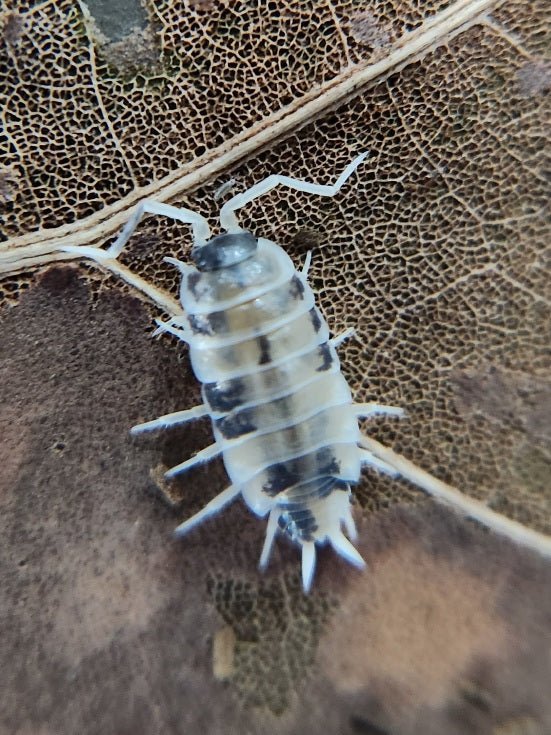Dairy Cow isopods are one of the most popular isopods available. The scientific name for them is Porcellio laevis "Dairy Cow." Dairy Cow isopods are larger white isopods with black speckles and markings. They are an excellent beginner species because Dairy Cow isopods are easy to care for, and under optimal conditions they can reproduce quickly. Isopods are detrivores, meaning they eat decaying matter such as leaves and rotten wood. Dairy Cow isopods are prized for their heavy-duty cleaning ability in bioactive terrariums.
Here are some facts about Dairy Cow isopods.
HABITAT: Dairy Cow isopods are terrestrial, and they can be housed in a plastic shoebox or glass aquarium with soil, leaf litter, and damp moss, in a bioactive enclosure, or in a terrarium.
REQUIREMENTS: Dairy Cow isopods need an organic soil, a lot of leaf litter like maple leaves and cottonwood leaves, damp sphagnum moss, decaying wood or cholla wood, a calcium source such as cuttlebone, crushed oyster shells, or crushed eggshells, and hides such as cork bark or seed pods. Dairy Cow isopods must always have a damp area to retreat to. They cannot survive if their environment is completely dry.
TEMPERATURE: Dairy Cow isopods thrive in room temperature environments (65F to 77F). If the temperature gets too high for a period of time, their health is in danger. Dairy Cows do not reproduce as quickly when temps are below 65F. Temperatures below freezing are also detrimental to the health of Dairy Cow isopods.
REPRODUCTION: Dairy Cow isopods carry their fertilized eggs and young in a pouch on their abdomen called a marsupium. It's exciting to watch a female give birth to her young as the babies, which are called mancae, crawl out of the pouch.
CLEAN-UP CREW: Dairy Cow isopods are an excellent docile clean-up crew member for bioactive terrariums. Dairy Cow isopods are a great addition to clean-up crews for monitors, skinks, tegus, snakes, roach bins, and bearded dragons. In over 10 years of keeping bioactive terrariums and isopods, we have never experienced any problems with larger isopods such as Dairy Cows harming reptiles. We do not neglect our bioactive terrariums, and they are well stocked with leaf litter and decaying wood, but there are stories on the internet about Dairy Cows possibly harming small or sensitive amphibians and reptiles. So use caution if you have a small animal, and your terrarium is not well stocked and maintained.
FAVORITE FOOD: Dairy Cow isopods along with all other isopods LOVE leaf litter and leaves. It is their main source of nutrition along with decaying wood, so do not skimp on the leaves. Dairy Cow isopods need a thick layer of leaves. Leaves that are preferred by Dairy Cow isopods are maple, cottonwood, sea grape, live oak, and magnolia. In our experience, the favorite leaves of Dairy Cow isopods are maple leaves and cottonwood leaves.
SUPPLEMENTAL FOODS: Dairy Cow isopods do like protein, and they benefit from a small supplemental feeding once a week of a protein source such as dried minnows, dried shrimp, fish food flakes, dried mealworms, et cetera. They also enjoy small pieces of vegetables like pumpkin, squash, and carrot. Protein and veggies are treats for isopods, so it is extremely important that small amounts that can be eaten within one to two days is fed once weekly.
USE AS A FEEDER INSECT: Dairy Cow isopods can be used as a feeder for reptiles and amphibians.
PET BUG: Dairy Cow isopods are exciting pet bugs. Children and adults love watching Dairy Cow isopods scurry around. Dairy Cow isopods are a sought-after educational pet that is easy for children of all ages to care for.
LIFESPAN: Dairy Cow isopods can live two years or more in a well-kept enclosure.
WHERE TO FIND DAIRY COW ISOPODS: Isopods can be found throughout the world under rocks, under decaying wood, and in decaying tree stumps. You can also find Dairy Cow isopods for sale at www.iheartbugs.com.
LIST OF NECESSARY ITEMS TO SUCCESSFULLY HOUSE PET DAIRY COW ISOPODS:
- Plastic shoebox, terrarium, or bioactive terrarium.
- Organic topsoil or a soil substrate. Fertilizer and pesticide free.
- Damp sphagnum moss.
- Leaf litter.
- Decaying wood or cholla wood.
- Hides such as cork bark or seed pods.
- Calcium source such as cuttlebone or crushed eggshells.
- Supplemental foods such as carrots and dried minnows.
- Buy Dairy Cow isopods, 10 minimum is best.
- Spray bottle to mist moss as needed to keep it damp.



